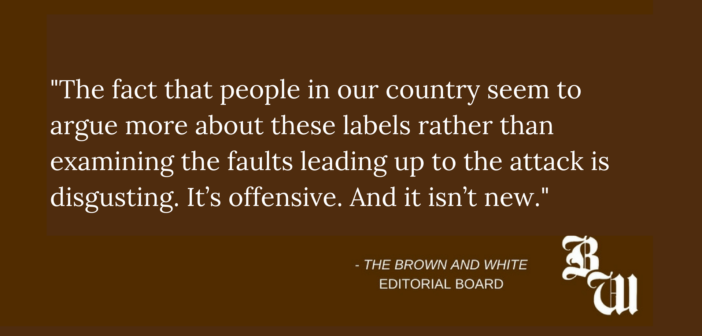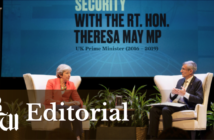A 64-year-old man took an elevator to the 32nd floor of the Mandalay Bay casino, along with 23 rifles, two of them fully automatic.
Scoping out a country music festival across the street, Stephen Paddock fired hundreds of rounds into a crowd of 22,000 people, killing at least 59 people and injuring over 500 others.
President Donald Trump tweeted his “warm condolences and sympathies” to victims and their families. The left yelled about how stricter gun laws would’ve prevented the attack. The NRA went dark, unresponsive to outreach from media outlets.
Fund drives were created. Blood was donated. Grisly details of the shooting were released.
But by 9 a.m. Monday, gun-maker stock price rallied back to early-September prices. The right, sternly but calmly, was declaring “now is not the time to talk about gun control.” People who vehemently speak about protecting themselves from foreign immigrants screamed about their Second Amendment rights.
Why?
Because this man was described as a “lone wolf.” He couldn’t be a terrorist. He didn’t fit the bill.
This man wasn’t Middle-Eastern. He didn’t have strong ties to any particular group. He was simply a white retiree from Mesquite, Nevada.
The media looked for motives, a match to fit the script of America’s “lone wolves.” Any reason to avoid placing absolute blame on the accused.
Money issues.
Paddock was a gambler, known to spend up to $30,000 a day on the casino floor. But he hadn’t owed anyone for any losses — he was simply an accountant with money to burn.
Mental illness.
Paddock’s father had a history of psychopathic tendencies and suicidal temperament. But Stephen never displayed any signs of personal instability. For white shooters in the past, insanity pleas seem prepared before bodies were even removed from the scene.
Political grievances.
Paddock had no strong political or religious affiliation. He did not claim to be a Democrat or Republican and was not registered to vote at his permanent address.
By legal and dictionary definition, Paddock is not labeled a terrorist. For lack of a better name, he was just another shooter.
Definitively choosing between the two labels creates a rift — one where mass shootings are considered a lesser evil in the fight against foreign terrorism.
The fact that people in our country seem to argue more about these labels rather than examine the faults leading up to the attack is disgusting. It’s offensive. And it isn’t new.
Trump’s administration has tried to toughen its travel ban in assuming that terrorism is a tool used by, and for, Muslim extremists. Democrats and Republicans use terrorism as a way to get the public thinking about gun control.
Debating whether someone is a terrorist or a mass shooter contextualizes the severity of the action. An attack does not need to be labeled terroristic to be terrorizing.
Public discourse shouldn’t be guided by how much someone wants to prove a point. It shouldn’t be measured in how many jabs one side gets in at the other before the next tragedy occurs.
We need action from politicians, not prayers. We need preventative measures, not retroactive condolences.
Determining the proper reaction for a tragedy is not an ideological issue. No one person or group gets to decide a national right out-values a human life.






Comment policy
Comments posted to The Brown and White website are reviewed by a moderator before being approved. Incendiary speech or harassing language, including comments targeted at individuals, may be deemed unacceptable and not published. Spam and other soliciting will also be declined.
The Brown and White also reserves the right to not publish entirely anonymous comments.